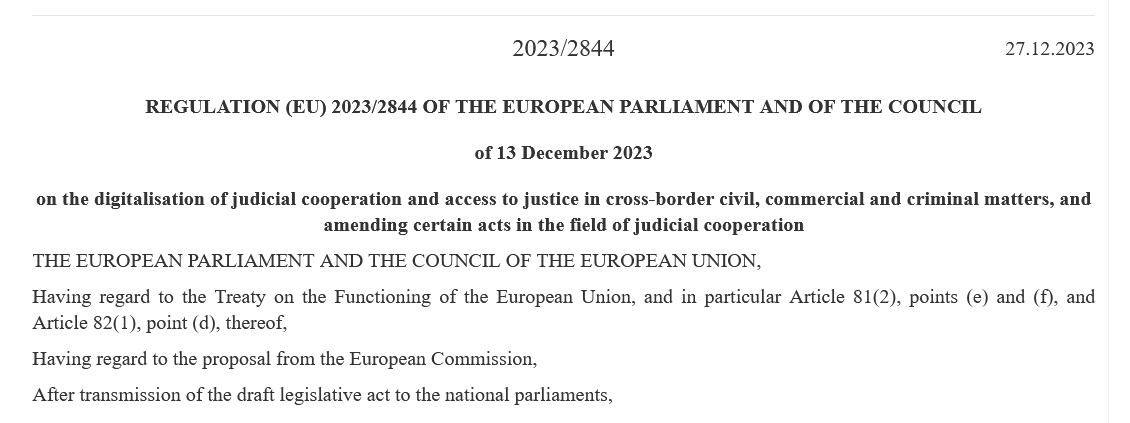Views
New EU Digitalisation Regulation: A Stepping Stone to Digitalised EU?
Author: Martina Ticic, assistant at the University of Rijeka, Faculty of Law and doctoral student funded by the Croatian Science Foundation (Hrvatska zaklada za znanost – HRZZ)
On 13 December 2023, two years after the first legislative proposal has been published, the new Regulation (EU) 2023/2844 of the European
Parliament and of the Council of 13 December 2023 on the digitalisation of judicial cooperation and access to justice in cross-border civil, commercial and criminal matters, and amending certain acts in the field of judicial cooperation (Digitalisation Regulation) has been adopted. While the process of digitalisation of judicial cooperation and cross-border procedures in the EU has been ongoing for some time already, the new Digitalisation Regulation represents a major step for advancing digitalisation practices in the EU.
Bahraini High Court on Choice of Court and Choice of Law Agreements
I. Introduction
It is widely recognized that choice of court and choice of law agreements are powerful tools for structuring and planning international dispute resolution. These agreements play an important role in “increasing legal certainty for the parties in cross-border transactions and reducing incentives for (the harmful version of) forum shopping.” (Alex Mills, Party Autonomy in Private International Law (CUP, 2018) p. 75). However, the realization of these objectives depends on the enforcement of the parties’ choice. Unfortunately, general practice in the MENA (North Africa and the Middle East) region shows that, with a few exceptions, the status quo is far from satisfactory. Choice-of-court agreements conferring jurisdiction on foreign courts are often disregarded or declared null and void. Similarly, the foreign law chosen as the governing law of a contract is often not applied because of the procedural status of foreign law as a matter of fact, the content of which must be ascertained by the party invoking its application. The recent judgment of the High Court of Bahrain (a first instance court in the Bahraini judicial system) in the Case No. 2/13276/2023/02 of 17 January 2024 is nothing but another example of this entrenched practice that can be observed in the vast majority of countries in the region.
U.S. Supreme Court Decides Great Lakes
On February 21, 2024, the U.S. Supreme Court handed down its decision in Great Lakes Insurance SE v. Raiders Retreat Realty Company, LLC.
The question presented was whether, under federal admiralty law, a choice-of-law clause in a maritime contract can be rendered unenforceable if enforcement is contrary to the “strong public policy” of the U.S. state whose law is displaced. In a unanimous opinion authored by Justice Kavanaugh, the Court concluded that the answer to this question was no. It held that choice-of-law provisions in maritime contracts are presumptively enforceable as a matter of federal maritime law. It further held that while there are narrow exceptions to this rule, state public policy is not one of them.
News
University of East Anglia Law Podcast Series on (Private and Public) International Law: Series 3 out now
All episodes of Series 3 of the University of East Anglia Law School Podcast are now out. Hosted by Rishi Gulati, they cover the following topics:
- The Future of International Investment Law (Muthucumarasamy Sornarajah)
- Double Standards in International Law (Patryk Labuda)
- The launch of the Elgar Companion to UNIDROIT (Edward Elgar, 2024)
- The Rise of International Commercial Courts (Giesela Rühl)
- The exercise of self-defence in outer space (Chris O’Meara)
- Greenland, Self-Determination, and the Geopolitical Contest (Maria Ackrén).
All episodes are available at SoundCloud, Apple Podcasts, and Spotify
Where do Children Reside? Where they are “at Home”
The Supreme Court of Canada has released its reasons for dismissing the appeal (which it did orally on December 9, 2024) in Dunmore v Mehralian, 2025 SCC 20. The narrow issue was the meaning of “habitual residence” for a child in the statutory context of the Children’s Law Reform Act (Ontario). The SCC had earlier explained that a hybrid approach to the meaning of habitual residence is to be used under the Hague Convention: Office of the Children’s Lawyer v Balev, 2018 SCC 16. In the convention, there is no definition of habitual residence. In contrast, the CLRA does provide elements of a definition of habitual residence (in s 22) though it leaves “resides” undefined. This generated the issue: under the statute, does the same hybrid approach apply or is the definition different because of the statute?
AMEDIP’s upcoming webinar: WIPO Expedited Arbitration on 26 June 2025 (in Spanish)

The Mexican Academy of Private International and Comparative Law (AMEDIP) is holding a webinar on Thursday 26 June 2025 at 14:30 (Mexico City time – CST), 22:30 (CEST time). The topic of the webinar is WIPO expedited arbitration: ADR and ODR in the era of technology disputes, videogames and e-sports and will be presented by Kiyoshi Tsuru and Óscar Suárez (WIPO) (in Spanish).



